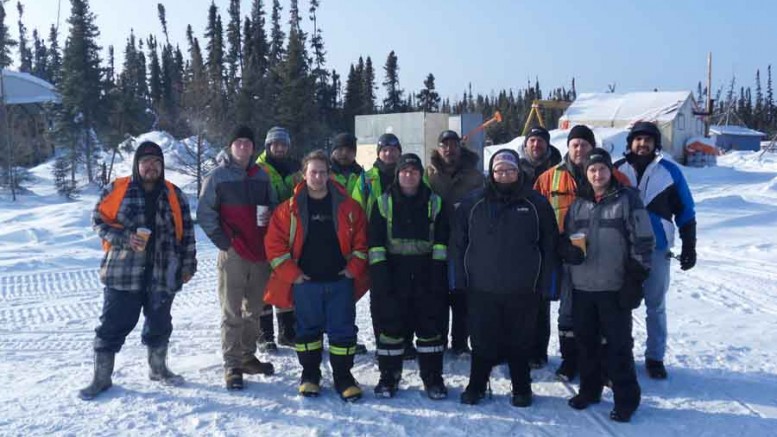VANCOUVER — It’s been a bountiful year of drilling for explorer Mega Precious Metals (TSXV: MGP) at its wholly owned Monument Bay project, 340 km southeast of Thompson, Man. The company was hoping an infill drill campaign on its potential pit shell might unearth more high-grade ounces closer to surface, and the strategy paid dividends on Oct. 8, when Mega unveiled an updated resource estimate.
The main gold and tungsten (WO3) mineralization at Monument Bay is centered on a felsic to intermediate feldspar and locally quartz porphyritic dyke, which strikes sub-parallel to surrounding volcanic and sedimentary rocks. The dyke is strongly spatially associated with the mineralization and structurally behaves as a competent rock relative to the surrounding volcanics and sediments, and is typically brecciated, with quartz vein fill containing both gold and tungsten.
Mega’s updated resource uses more conservative parameters compared to previous reports, including: a 20% gold-price reduction to US$1,092 per oz.; 4.7% drop in recoveries to 90%; and 20% jump in in-pit constrained costs. The result is an estimate with lower overall in-situ ounces, but materially higher grades.
The adjustments have resulted in a 25% decrease in overall measured and indicated ounces and a 50% increase in pit-constrained inferred ounces. The in-pit measured and indicated grade has improved by 9%, while the inferred grade has increased by 27%.
“All the drilling we’ve been doing over the past year has really been concentrated on bringing higher grades right up to surface. In particular, the central part and western ends of the deposit have combined to help us do it. That really helped with the pit dynamics and the early stage engineering,” president and CEO Glen Kuntz explained during a conference call. “We believe that the current resource and the significant potential to grow resources confirm the emergence of a high-grade gold and tungsten camp at Monument Bay.”
The updated resource features 13,500 metres of drilling in August, and boosts Monument Bay’s global measured and indicated resources to 48 million tonnes grading 1.43 grams gold for 2.2 million contained oz. Inferred resources tack on 29.5 million tonnes of 0.99 gram gold for 1 million contained oz.
Most of the gold is centered on the main Twin Lakes deposit, which also accounts for the project’s tungsten by-product credit. Twin Lakes hosts an indicated resource grading 1.5 million tonnes of 1.67 grams gold and 0.17% WO3. Another upside for Mega is the delineation of a higher-grade starter pit that holds 1.1 million oz. grading 2.9 grams gold and 86,000 tonnes WO3.
“We also have a better handle on the controls of the high grade, and we can get really continuous core that starts right at surface. Compared to our resource last year, we’ve tightened up our measured and indicated, and had impacts from things like gold price, operating costs and recoveries. Our infill drilling has had a positive effect, and you see that through the rising grade,” Kuntz added.
Mega aims to publish a preliminary economic assessment (PEA) that incorporates data at Monument Bay in the first half of 2015. The company has been working on its metallurgical studies to incorporate the tungsten credits into its model, and released an update in October.
Recent test results suggest a 90.3% overall gold recovery using “conventional milling,” which includes recovery from a bulk-sulphide concentrate, extraction in pressure-oxidation leaching and gold recovery in a carbon-in-pulp circuit.
Two options are being considered for the tungsten. The first involves recovery from bulk-sulphide flotation tailings by scheelite rougher flotation, with cleaner flotation and acid leaching to bring the final concentrate to a 65% WO3 grade. An alternative scenario would be to produce a lower-grade (30% WO3) concentrate without acid-leaching impurities, followed by hydrometallurgically processing the concentrate to make ammonium paratungstate.
“We’ve put together two circuits … one is the gold-only circuit, while the second focuses on areas where we’d like to recover the tungsten,” Kuntz said. “In that regard we’re looking at whether we’d do a higher-grade concentrate for sale or a lower-grade option we’d upgrade. One thing that’s important is that our orebody is extremely carbonate right, which is useful … it neutralizes all of our tailings, so we are not acid-generating.”
Mega is also chasing upside on Monument Bay’s wider 340 sq. km property package. The company has finished geophysical surveys to outline areas of interest, and is wrapping up a lithological drilling. There is more blue sky around the project’s AZ and Mid-East zones, which host smaller resources that remain open.
“Some of the new geophysical data we’ve been collecting and modelling is indicative that the Twin Lake shear zone is sheared lens of a fairly large-scale fold,” senior project geologist Ryus St. Pierre noted. “There’s potential we have a mirror image — or similar system — 1 km south. We have strong tungsten intersections to the east, as well as visible gold. We have 100 km of structure with a lot of potential that has yet to be explored.”
Mega shares have traded within a 52-week window of 7¢ to 24¢, and jumped 7% on the Monument Bay resource update en route to an 8.5¢ close at press time. The company reported cash and equivalents of US$1.5 million at the end of June, and has 173.2 million shares outstanding for a $13.9-million market capitalization.


Be the first to comment on "Mega Precious Metals’ emerging gold-tungsten camp at Monument Bay"